Este sábado 2 de abril se desarrolló en dependencias de la Universidad Católica Silva Henríquez, el encuentro entre el Relator Especial de las Naciones Unidas para el Derecho a la Educación, Kishore Singh, con distintas organizaciones agrupadas en el Foro por el Derecho a la Educación. La reunión consistió en reportar al Relator la situación del derecho a la Educación en Chile, así como también su propia impresión respecto al Derecho a la Educación y vías de acción.
Juan González, investigador representante del Observatorio Chileno de Políticas Educativas de la Facultad de Ciencias Sociales de la Universidad de Chile – OPECH -y del Centro de Alerta, graficó la situación precaria del derecho a la Educación en Chile a través de una serie de ejemplos, como su lugar en la constitución, la desarticulación del sistema público garantista, la expulsión de más 11 mil estudiantes en el año 2011 por movilizarse a favor de una Educación Pública, o el reciente despido en diciembre de 2015 de 33 profesores por la municipalidad de Renca al movilizarse contra la Carrera Docente de la Nueva Mayoría.
Para el investigador, así como para los movimientos sociales, el debilitamiento del derecho a la Educación como derecho social garantizado tiene directa relación con la mercantilización de la Educación, ya que en Chile «la libertad de enseñanza, como libertad de mercado, limita la acción reguladora que el Estado debe tener». Esto, porque “La institucionalidad pública no ha podido ponerle límites a la Educación de Mercado. El derecho a la Educación no goza de una garantía constitucional, como sí lo hace la libertad de enseñanza. Hoy el nuevo gobierno la ha reforzado como la libertad de elegir establecimientos por parte de los padres, esto se plasma en una libertad de mercado, de oferta y demanda”.
La introducción del mercado tiene como uno de sus efectos principales la segregación educativa, la cual “ha convertido a la educación pública en un gueto para los más empobrecidos». Actualmente, “más del 65% de la matrícula está en manos de privados”, en donde, en vez del Estado, regula el mercado. Señala González “hay más de 900 programas de formación inicial para profesores, programas de pregrado que aparecen y desparecen, sin mayor proyección laboral, ni vinculación con algún proyecto productivo para el país, o las comunidades». Así, “el Estado actúa solamente como una tesorería, repartiendo y fiscalizando recursos”.
Así, “se ha perdido el sentido de la Educación Pública”. En efecto, en Chile no existe un Plan Nacional de Educación construido por la sociedad y consensuado democráticamente, como si lo hay en otros países. Básicamente, dependemos de las reformas que los gobiernos de turno vayan haciendo, reformas que lo que han hecho es fortalecer el mercado y debilitar la institucionalidad del Estado”. Es por esto que, para Juan González, “la evidencia muestra que en la educación chilena se ha fortalecido al mercado en desmedro de la educación pública y gratuita”. De esta forma, lo que se necesita es “reposicionar el Derecho a la Educación como un Derecho Social universal garantizado en nuestra Constitución”, en línea con lo señalado repetidamente en otras instancias por el propio Relator Especial.
Luego, otras organizaciones miembros del Foro hicieron apreciaciones respecto a cómo el derecho a la Educación se ve vulnerado en distintos campos. Así, por ejemplo, de la Red de Jardines de Centros Comunitarios reclaman que “la primera niñez sea mirada con respeto y dignidad, como sujeto y no como objeto”. Lamentablemente, la Educación Parvularia representa sólo un 40% para alcanzar este derecho fundamental y además, “sólo “el 20% de las guaguas asisten a jardines infantiles y salas cunas”: Los niños en escuelas son sometidos a la sobre-escolarización, a largos periodos de tiempo para satisfacer la necesidad de que las familias trabajen y se sustenten. Las salas cunas y jardines infantiles están subestimando la necesidad de los seres humanos de jugar y compartir… que tiene opinión”. “los cambios deben considerar al territorio como una base fundamental para hacer Educación”.
Elisa Loncón, de la Red de Educación Intercultural Bilingüe y acompañada por representantes de la red, ha mencionado que uno de los grandes problemas es que no hay una política lingüística para el desarrollo de la lengua originaria y su uso funcional: “hay un programa de educación intercultural bilingüe, pero que tiene un gran problema y es que tiene el 0,00046% del presupuesto del Ministerio. Con eso no se puede hacer”. Además, denuncian que como la enseñanza la hacen educadores tradicionales, pues no hay formación de profesores para enseñanza de la lengua, éstos “son discriminados en sus derechos laborales, reciben sueldo sólo tres veces al año, no tienen contrato. Asimismo, reclama que el “currículum nacional no incorpora los conocimientos y valores de los pueblos originarios”: por lo mismo, “Chile es un país tremendamente racista”, dado que “los pueblos originarios no somos prioridad”. Esto último se refleja en la discusión de la oficialidad de la lengua, aprobada por Contraloría, pero que en la cual el gobierno no tiene voluntad de avanzar.
Patricia Laredo, del Colectivo sin Fronteras, evidenció la situación del Derecho a la Educación falla gravemente en la población migrante. Por esto, denuncia la larga historia de las familias con vulneraciones de derecho en sus países de origen empobrecidos, que llegan a Chile a ser parte de “un nuevo segmento de pobres”. Los niños y niñas migrantes tienen otros problemas adicionales, pues al no ser chilenos y no tener visa, no tienen derecho a condiciones básicas por no existir para el aparato estatal: “hay un número importante de niños que se quedan sin estudiar, hay establecimientos educacionales que rechazan la matrícula a los niños que no tengan cédula de identidad chilena”. Tampoco pueden “acceder a la salud y programas de alimentación escolar, quedando en manos de la buena voluntad o indiferencia de actores de la Educación que pueden ceder atención en salud escolar o alimentación, que son supuestamente derechos garantizados a todos los niños en Chile”. En síntesis, los niños migrantes están en una situación vulnerable, pues no hay una “homologación de derechos” con los niños chilenos, pese a constituir el 2% de la población chilena y comparten el racismo cotidiano que reproduce violencia simbólica o física, en conjunto con la población indígena en nuestro país.
Mario Aguilar, dirigente del Colegio de Profesores, añadió a este cuadro cómo la Reforma Educacional no ha dado cuenta de los grandes cambios que la sociedad chilena demanda. Esto, “pues no ha sacado al mercado de la Educación”. En el caso particular de la Carrera Docente, ésta “tiene una lógica economicista, con un management, y no con el empoderamiento de las comunidades para fortalecer el desarrollo profesional docente”. También ha señalado críticas de cómo la Educación pública se financia vía vouchers, compitiendo con los privados captando clientes: esta lógica ha perjudicado a la Educación Pública. Por lo mismo, ésta “no es una verdadera reforma, sino sólo un maquillaje a la Reforma”.
Iván Salinas, de la Campaña Alto al SIMCE, señala que el derecho a la Educación es vulnerado a través de la implantación del SIMCE, esto porque con la prueba “se van a cerrar escuelas públicas en 4 años más, 100 escuelas públicas, basados en sus resultados”. Esto perjudicará al derecho a la Educación por la falta de inclusión en las escuelas públicas, y esa matrícula será captada por escuelas privadas. Al mismo tiempo, el SIMCE implica que “no hay proyectos pedagógicos, que respondan a la diversidad de estudiantes”: “el único proyecto pedagógico que hay es el de la estandarización, que no responde a la diversidad de los sectores más pobres, indígenas e inmigrantes”. Por último, el portavoz de la Campaña Alto al SIMCE denuncia el estrés y represión al que son sometidos a los niños y niñas para responder al desempeño educativo exigido.
Diego Parra, miembro de la Cooperativa Centro de Alerta e Investigador de OPECH, releva que hay distintas instancias en las cuales se ha vulnerado el Derecho a la Educación: por ejemplo, “con el cierre de escuelas en Cerro Navia o del Liceo Experimental Artístico de la municipalidad de Santiago”. Asimismo, acusa cómo el Estado ha cerrado jardines comunitarios autogestionados, pese a ser una instancia de involucramiento efectivo de las comunidades en su proceso educativo. En la ocasión hace entrega al relator de los jardines comunitarios autogestionados en Chile el 2015, así como los testimonios de las comunidades educativas de 42 organizaciones agrupadas en JourneyforJustice Alliance en Chicago- EEUU sobre el cierre de sus escuelas y jardines, y el avance de la privatización de la educación. (http://www.j4jalliance.com/).
Kishore Singh: “es necesario erradicar el concepto de Educación como acto de consumo”.
En su alocución, el Relator defendió la noción del Derecho a la Educación como un derecho social garantizado constitucionalmente. En esa línea, hace un llamado a “retroceder a las fuerzas de la privatización”. Para esto, reclamó que se debe considerar a la Educación como un bien sin exclusión. “Lo que es necesario es erradicar es la Educación es un acto de consumo, y llegar a la educación de calidad y para todos”.
Asimismo, el Relator da cuenta de la información sobre la privatización en Chile. Así, declara conocer los estudios de la OCDE que señalan que “las escuelas privadas no son mejores que las públicas”, y que le han comentado en su visita a Chile que hay escuelas privadas que carecen de una buena infraestructura.
Además, afirmó que las organizaciones sociales presentes tienen una “visión exacta de cada elemento relativo a la inclusión”, como en la situación de los migrantes e indígenas. En este sentido, defendió “el derecho de los migrantes al reconocimientos y a la necesidad de que la preservación de las lenguas de los pueblos originario”, agregando que “lo multicultural y lo multilingüístico es parte de la Agenda del 2015”.
Instó a los docentes que, a propósito de la reforma, “sigan levantando a la voz. Estaré siguiendo de cerca la implementación”, añadiendo que los privados “no van a prestar mucha atención a la formación de sus profesores… pueden decir que lo están haciendo, pero no lo estarán”.
Por último, aludió a la necesidad de una educación parvularia de buena calidad para todos los niños, en el cual hace un llamado a que la denominada “reforma a la educación parvularia” se implemente bien. Por lo cual agrega que “Hay que aunar esfuerzos a nivel internacional a fin de lograr la Educación de buena calidad en todos los niveles”, reconociendo en este último punto el trabajo de la Campaña Latinoamericana por el Derecho a la Educación.
“Tenemos que hacer mucho contra las fuerzas de la privatización”.
Cabe destacar que las diversas organizaciones reunidas dan cuenta que, pese a los “avances” pregonados por el gobierno acerca de la llamada “reforma educacional”, ésta no se ha diseñado ni para frenar la privatización ni para sacar al mercado de la Educación. En cambio ha mantenido intactos los pilares de mercado, como lo han denunciado los distintos colectivos en presencia del Relator. Debido a este mismo escenario de “cambios”, es imprescindible que los movimientos sociales nos sigamos movilizando por cambios estructurales, para convertir en Chile efectivamente el Derecho a la Educación en un derecho social garantizado, tal como ha venido reclamando insistentemente el propio Relator de la ONU.
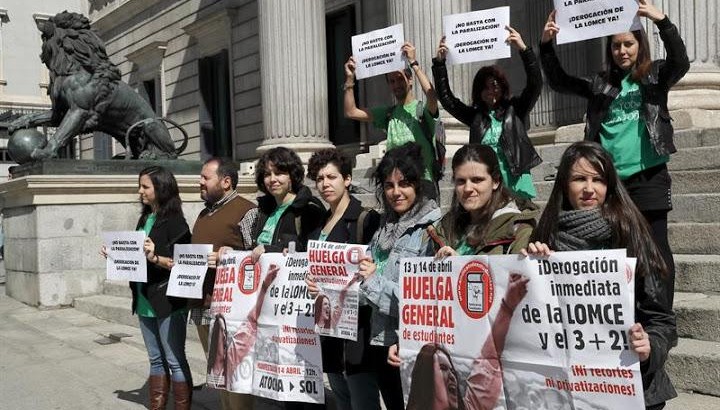
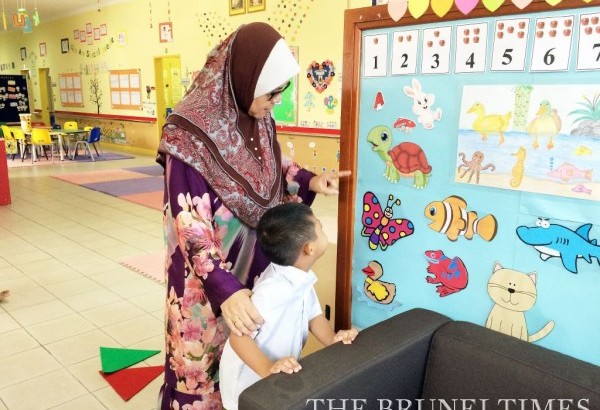
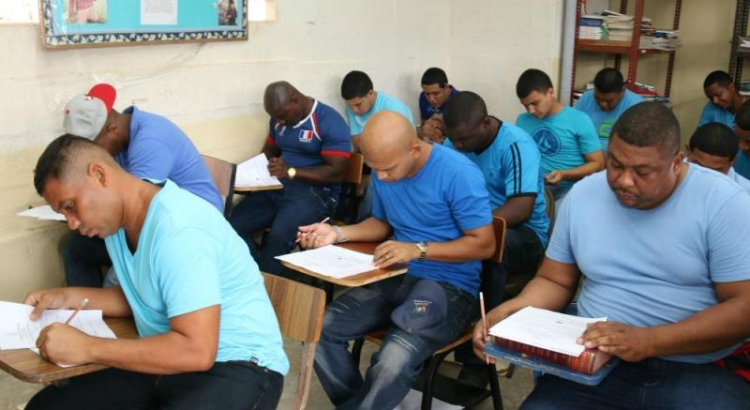
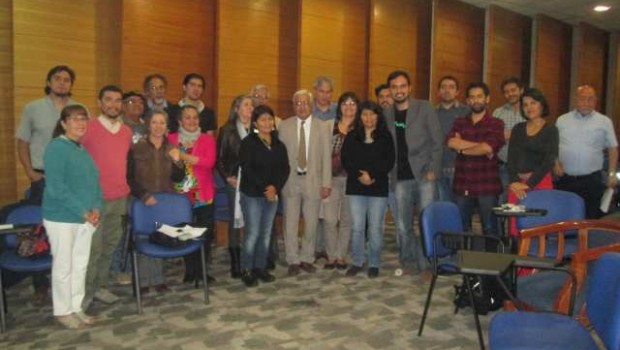
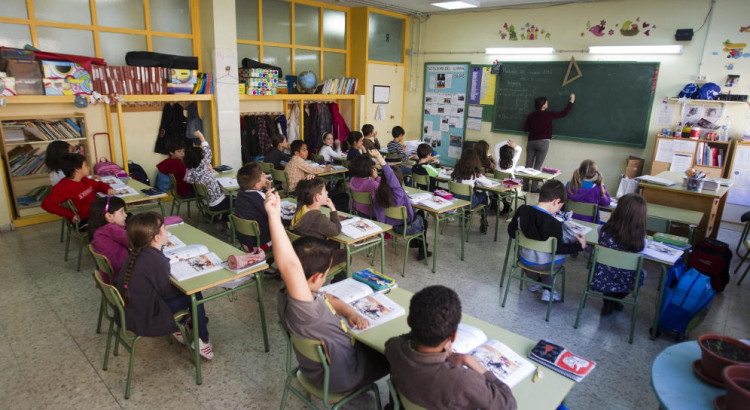
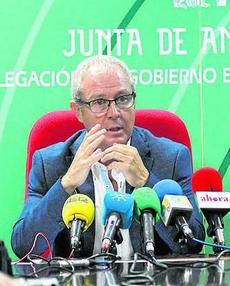
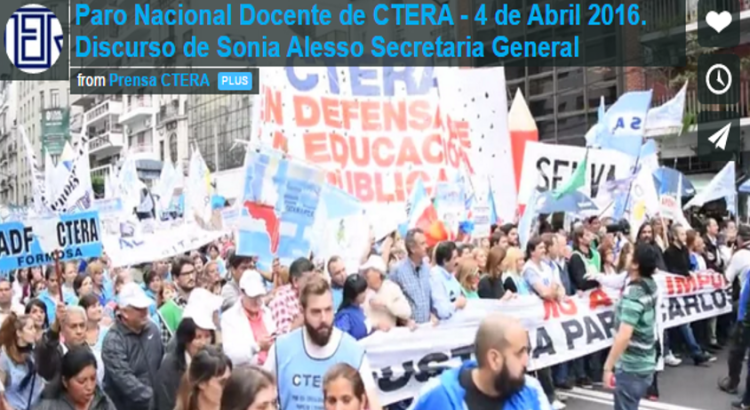


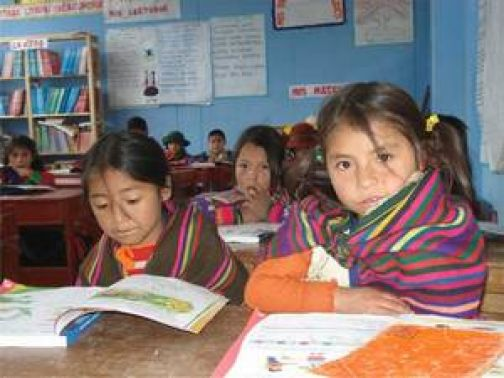






 Users Today : 66
Users Today : 66 Total Users : 35459661
Total Users : 35459661 Views Today : 136
Views Today : 136 Total views : 3418108
Total views : 3418108